Hãy nhập câu hỏi của bạn vào đây, nếu là tài khoản VIP, bạn sẽ được ưu tiên trả lời.

| Subject pronoun | Object pronoun |
|
I |
(1) me |
| he | (2)him |
| she | (3)her |
| it | (4)it |
| we | (5)us |
| you |
(6)you |
| they | (7)them |
Tựa đề 1 : COMPLETE THE GRAMMAR TABLE WITH THE OBJECT PRONOUNS
II. Choose the correct pronouns tp complete the next.
My sister and her family live in Turkey. (1) (We)/ US don;t see (2) they / them very often, but (3) they / them Skype (4) we / us . (5) She / Her husband's name is Mehmet. (6) He / Him is from Istanbul. (7) HE/ Him is very nice. We all like (8) he/ him.
III. Write the plural form of these words.
1. sandwich
sandwiches
2.bag
bags
3. fish
fish
4. wowan
women
5. box
boxes
6. tomato
tomatoes
7. day
days
8.city
cities
| Subject pronoun | Object pronoun |
|
I |
(1) me |
| he | (2) him |
| she | (3) her |
| it | (4) it |
| we | (5) us |
| you |
(6) you |
| they | (7) them |
Tựa đề 1 : COMPLETE THE GRAMMAR TABLE WITH THE OBJECT PRONOUNS
II. Choose the correct pronouns tp complete the next.
My sister and her family live in Turkey. (1) (We)/ US don't see (2) they / (them) very often, but (3) (they) / them Skype (4) we / (us) . (5) She / (Her) husband's name is Mehmet. (6) (He) / Him is from Istanbul. (7) (HE)/ Him is very nice. We all like (8) he/ (him).
III. Write the plural form of these words.
1. sandwich
sandwiches
2.bag
......bags........
3. fish
......fish........
4. wowan
.......women........
5. box
......boxes.......
6. tomato
........tomatoes..........
7. day
......days........
8.city
......cities........

Đại Từ Tân Ngữ
Đại từ tân ngữ cũng là đại từ nhân xưng nhưng chúng không được làm chủ ngữ mà chỉ được làm tân ngữ hay bổ ngữ.
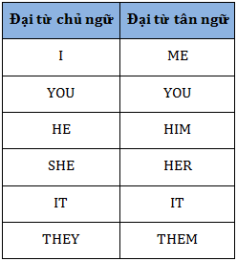
Đại Từ Nhân Xưng
Đại từ nhân xưng là những từ dùng để xưng hô trong giao tiếp. Ngôi thứ nhất thuộc về người nói, ngôi thứ hai thuộc về người nghe, ngôi thứ ba thuộc về người hoặc con vật hoặc đồ vật mà người nói và người nghe đề cập tới. Đại từ nhân xưng được làm chủ ngữ nên có thể gọi chúng là đại từ chủ ngữ.
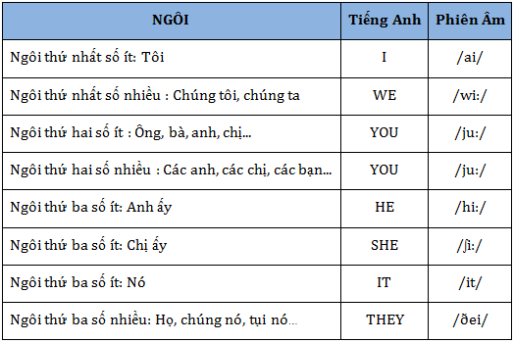 * Lưu ý:
* Lưu ý:
- Khi muốn kêu người nào đó từ xa, ĐỪNG BAO GIỜ kêu “YOU, YOU” vì như vậy là rất bất lịch sự. Nếu người đó là nam, có thể kêu MR, nữ, có thể kêuMRS, hoặc MISS.
- “IT” chỉ dùng cho con vật, đồ vật, sự vật hoặc danh từ trừu tượng, không bao giờ dùng để chỉ người. Trong tiếng Việt, ta có thể dùng “NÓ” để chỉ người thứ ba nào đó. Trong trường hợp này, trong tiếng Anh, chỉ có thể dịch “NÓ” thành “HE” hoặc “SHE” tùy theo giới tính.
Đại Từ Sở Hữu
Người ta dùng đại từ sở hữu để tránh khỏi phải nhắc lại tính từ sở hữu + danh từ đã đề cập trước đó. Nó có nghĩa: mine = cái của tôi; yours = cái của (các) bạn; … Do đó chúng thay thế cho danh từ. Đừng bao giờ dùng cả đại từ sở hữu lẫn danh từ. Mặc dù cách viết của his và its đối với tính từ sở hữu và đại từ sở hữu là giống nhau nhưng bạn cần phân biệt rõ hai trừờng hợp này.
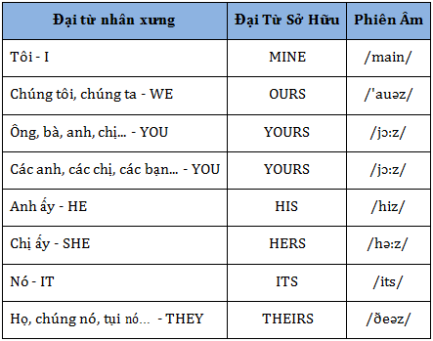
Tính Từ Sở Hữu
Tính từ sở hữu khác với đại từ sở hữu (nêu trên) ở chỗ nó bổ nghĩa cho danh từ chứ không thay thế cho danh từ. Gọi là tính từ sở hữu vì nó thể hiện tính chất sở hữu của người hoặc vật đối với danh từ đi sau nó. Chú ý rằng cũng dùng tính từ sở hữu đối với các bộ phận trên cở thể.
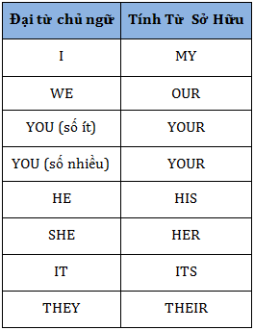
Đại Từ Tân Ngữ
Đại từ tân ngữ cũng là đại từ nhân xưng nhưng chúng không được làm chủ ngữ mà chỉ được làm tân ngữ hay bổ ngữ.

Đại Từ Phản Thân
Đại từ phản thân là đại từ đặc biệt phải dùng khi chủ ngữ và bổ ngữ là một.
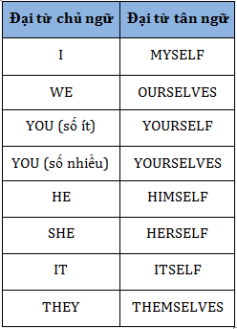
TỔNG HỢP
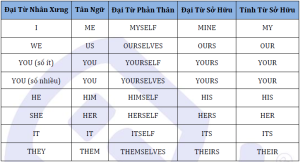

1. go camping
2. go to a disco
3. take photos
4. swim
5. have an ice cream
6. do
7. play games
8. buy souvenirs
EX1:complete the sentences with the words given in the box
| buy souvenirs | go camping | go to a disco | swim |
| have an ice cream | play games | take photos | do |
1.When we ...go camping , ..... we sleep in a tent.
2.Do you want to ...go to a disco... and dance?
3.Can he .....take photos....with his new camera?
4.It's hot! I want to......swim.....in the sea.
5.Would you like to.....have an ice cream....? The chocolate ones are good.
6.You can...do.....a treasurehunt at our summer camp.
7.I sometimes......play games.......like table tennis.
8. You can .....buy sourvernirs.... at the shop in the town.

|
(1) forget
(2) turn
(3) Be
(4) Bring
(5) wait
(6) open
(7) make
(8) Have

Choose the best answer to fill in each blank.
1. My aunt speaks English very ................................
|
A. good |
B. well |
C. goodly |
D. best |
2. We have math on Tuesday, Thursday, and Friday; It means we have math .................. a week.
|
A. once |
B. twice |
C. three times |
D. four times |
3. Lan promises to ............................ her best in learning English.
|
A. try |
B. make |
C. work |
D. learn |
4. Learners don’t only learn the meaning ......................... the spelling and pronunciation of new words.
|
A. too |
B. as well as |
C. also |
D. but also |
có don't only (not only) nên dùng but also
5. The manager asked me ............................. for him outside his office.
|
A. wait |
B. waiting |
C. to wait |
D. waited |
6. She hasn’t written to me ........................................
|
A. already |
B. yet |
C. never |
D. any longer |
7. Would you be ................................ to hold the door open?
|
A. kind enough |
B. too kind |
C. as kind |
D. so kind |
8. Take the number 7 bus and get ......................... at Forest Road.
|
A. up |
B. down |
C. outside |
D. off |
get off : xuống xe
9. They have never come ............................ such a beautiful village before.
|
A. off |
B. along |
C. at |
D. across |
10. Surely David’s not going to drive, .......................... he?
|
A. does |
B. isn’t |
C. is |
D. will |
Give the correct form of the words in the brackets.
1. He fell off the bike, but his ................injuries............... were not serious. (injure)
2. She gave me a ...................demonstration............ of the new house. (demonstrate)
3. The shop .........assistant.................... showed me a lot of new models. (assist)
4. You must read the following ..............safety................. precautions carefully. (safe)
5. You shouldn’t talk about her character only through her ..............appearance............ (appear)
6. We are waiting for the ...................arrival........... of our uncle’s train. (arrive)
7. The increase in population has led to ....................crowded................ in many cities. (crowd)
8. We had a terrible trip because the weather was .............unpleasant................ (please)
9. If you want to get more ............information...................., please contact Mr. Phong. (inform)
10. It’s a good restaurant; the food there is very ...........tasty................ (taste)
Choose the best answer to fill in each blank.
1. My aunt speaks English very ................................
|
A. good |
B. well |
C. goodly |
D. best |
2. We have math on Tuesday, Thursday, and Friday; It means we have math .................. a week.
|
A. once |
B. twice |
C. three times |
D. four times |
3. Lan promises to ............................ her best in learning English.
|
A. try |
B. make |
C. work |
D. learn |
4. Learners don’t only learn the meaning ......................... the spelling and pronunciation of new words.
|
A. too |
B. as well as |
C.also |
D. but also |
5. The manager asked me ............................. for him outside his office.
|
A. wait |
B. waiting |
C. to wait |
D. waited |
6. She hasn’t written to me ........................................
|
A. already |
B. yet |
C. never |
D. any longer |
7. Would you be ................................ to hold the door open?
|
A. kind enough |
B. too kind |
C. as kind |
D. so kind |
8. Take the number 7 bus and get ......................... at Forest Road.
|
A. up |
B. down |
C. outside |
D. off |
9. They have never come ............................ such a beautiful village before.
|
A. off |
B. along |
C. at |
D. across |
10. Surely David’s not going to drive, .......................... he?
|
A. does |
B. isn’t |
C. is |
D. will |
Give the correct form of the words in the brackets.
1. He fell off the bike, but his ................injuries............... were not serious. (injure)
2. She gave me a .................demonstration.............. of the new house. (demonstrate)
3. The shop ...............assistant.............. showed me a lot of new models. (assist)
4. You must read the following .................safety.............. precautions carefully. (safe)
5. You shouldn’t talk about her character only through her ..............appearance............ (appear)
6. We are waiting for the ................arrival.............. of our uncle’s train. (arrive)
7. The increase in population has led to ....................overcrowding................ in many cities. (crowd)
8. We had a terrible trip because the weather was ...............unpleasant.............. (please)
9. If you want to get more .................information..............., please contact Mr. Phong. (inform)
10. It’s a good restaurant; the food there is very ................tasty........... (taste)

1. "Could you please give me my dictionary ?" - "...................... "
| A. Yes, I could | B. Sure. Here you are |
| C. No, I couldn't | D. Yes, please |
2. "Are you doing anything tonight ?" - " ............................. "
| A. Yes, I'm doing anything tonight. |
| B. No, I'm completely free tonight. |
| C. I am doing tonight. |
| D. I am not doing tonight. |
3. "What does your father do ?" - ".................."
| A. He is working in a factory. |
| B. He is sleeping. |
| C. He is fine. |
| D. He is good. |
4. "How far is it from your house to your school ?" - "....................."
| A. It takes a long time. |
| B. It is fine. |
| C. It is about 2 km. |
| D. I walk to school. |
5. "How much are your new shoes ?" - "........................"
| A. They are 150,000 VND. |
| B. They are made in Vietnam. |
| C. They are good. |
| D. I like them. |

1. What ................. you ............. in this dark room ?
| A. are .... do | B. are ...doing | C. are ... done | D. x.... do |
2. What did he ............. to her yesterday ?
| A. said | B. say | C. says | D. saying |
3. I ...................... . It's harmful.
| A. never smoke | B. am never smoke | C. smoke | D. smoking |
4. I like living in this street ...................... it is noisy.
| A. even though | B. despite | C. in spite of |
5. Hong's room is very dirty. Mine is much ...................... .
| A. clean | B. cleaner | C. cleaning |
6. The play was very boring. It's the .................. film I' ve ever seen.
| A. worst | B. best | C. good |
7. The children will be ............... if he teaches them English.
| A. happily | B. happiness | C. happy |
8. Water ....................... most of the Earth's surface.
| A. covers | B. cover | C. covered |
9. " Have a nice trip !" - " ........................... "
| A. Thanks | B. You're welcome | Goodbye |
1. What ................. you ............. in this dark room ?
| A. are .... do | B. are ...doing | C. are ... done | D. x.... do |
2. What did he ............. to her yesterday ?
| A. said | B. say | C. says | D. saying |
3. I ...................... . It's harmful.
| A. never smoke | B. am never smoke | C. smoke | D. smoking |
4. I like living in this street ...................... it is noisy.
| A. even though | B. despite | C. in spite of |
5. Hong's room is very dirty. Mine is much ...................... .
| A. clean | B. cleaner | C. cleaning |
6. The play was very boring. It's the .................. film I' ve ever seen.
| A. worst | B. best | C. good |
7. The children will be ............... if he teaches them English.
| A. happily | B. happiness | C. happy |
8. Water ....................... most of the Earth's surface.
| A. covers | B. cover | C. covered |
9. " Have a nice trip !" - " ........................... "
| A. Thanks | B. You're welcome | Goodbye |

|
4. children/ first/ on/ most/ school/ excited/ are/ day/ of/ the
Most children are excited on the first day of school.
5.Tet holiday is an important occasion in Viet Nam. It is the time for family gathering and reunion. People often prepare for Tet even some weeks (1) before the holiday itself. They (2) decorate the houses and paint the walls. They all want their home to look nice for Tet.
On the New Year’s Eve, the whole family gather and have dinner to gether. They talk about things that happen during the previous year, and all (3) pray for good luck in the new year. When midnight strikes, they go to enjoy the fireworks. Some go to pagodas. Children get lucky money or presents during Tet holiday.
1. you
2. it
3. him
4. her
5. us
6. you
7. them